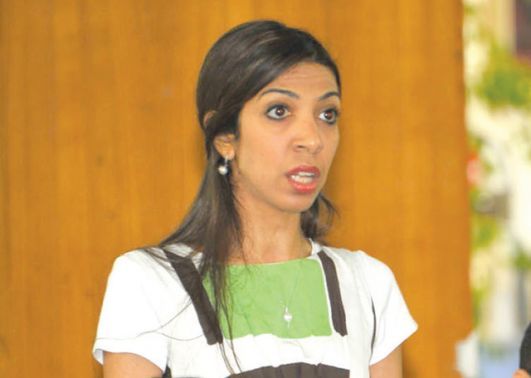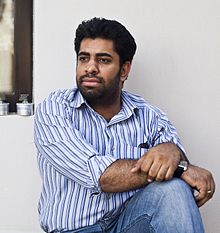1 Sep 2014 | Bahrain, Middle East and North Africa, News
UPDATE 4 September 17:22: Maryam Alkhawaja has a court date scheduled for 9am on Saturday 6 September, according to Travis Brimhall, head of the international office at the Bahrain Center for Human Rights.
Prominent human rights activist Maryam Alkhawaja has been jailed in Bahrain. She was detained at Bahrain International Airport on Friday as she tried to enter the country, and has yet to meet with her lawyer.
Alkhawaja, a dual Danish-Bahraini citizen, had her Danish passport confiscated and was told she no longer held Bahraini citizenship. She was also barred from using her phone or contacting her family, according to the Gulf Centre for Human Rights (GCHR), the organisation of which she is co-director. GCHR also reported that she was interrogated on charges of assaulting and injuring police officers, while lawyer Mohamed Al Jishi said he was not allowed to speak to his client before she was questioned. She is currently held in Isa Town women’s prison.
Alkhawaja was travelling to see her imprisoned father, who last week started a hunger strike. Abdulhadi Alkhawaja is a Bahraini human rights campaigner who co-founded the Bahrain Centre for Human Rights (BCHR), which won the 2012 Index Freedom of Expression Award for Advocacy. He was sentenced to life in prison on terrorism charges following pro-democracy protests that swept the country in 2011. Abdulhadi and his daughters Maryam and Zainab are outspoken critics of human rights violations in the constitutional monarchy, which is categorised as “not free” by Freedom House.
The case first gained attention after Alkhawaja tweeted about being detained on Friday, and an unnamed person close to the family continues to provide updates through her Twitter account. On Saturday, the account reported that she is also facing charges of insulting the king of Bahrain and over an anti-impunity campaign she was involved with in November 2013.
Human Rights Watch called the arrest “outrageous”, while GCHR has labelled the charges “fabricated” and has called on the international community to put pressure on Bahraini authorities to release father and daughter. The Danish Ministry of Foreign Affairs is sending a representative to Bahrain to provide support. Foreign Minister Martin Lidegaard tweeted on Sunday that a “solution must be found in Al-Khawaja case” and that he has raised the issue with the European Union.
This comes as the Supreme Court of Appeal in Bahrain on Sunday upheld a 10-year sentence on photographer Ahmad Humaidan. He was convicted over an attack on a police station in 2012, but human rights groups believe the case against him is connected to his coverage of pro-democracy demonstrations.
This article was posted on 1 Sept 2014 at indexoncensorship.org
4 Nov 2013 | Bahrain, Middle East and North Africa, News

Maryam Alkhawaja accepts the Rafto Prize on behalf of the Bahrain Centre for Human Rights (Image: Lind and Lunde/Rafto Foundation)
The Bahrain Center for Human Rights (BCHR) was awarded the Rafto Prize for human rights at a ceremony in Bergen, Norway last night.
BCHR won for its peaceful fight for fundamental rights of freedom of expression and assembly in the Gulf kingdom, the award committee said.
Acting president of BCHR, Maryam Alkhawaja, was in Bergen to accept the prize. President Nabeel Rajab has been imprisoned since July 2012 for criticising authorities on Twitter. Marayam’s father and sister, Abdulhadi and Zainab, prominent human rights defenders in Bahrain, are also jailed for their opposition to the regime.
“The person who should be on this stage is not me but the people on the streets in Bahrain. They are the unnamed heroes,” Alkhawaja said in her acceptance speech.
She also read out a letter from Rajab: “Brutal violations are still continuing today against peaceful Bahrainis while the whole world continues to stay silent, especially Bahrain’s western allies. Our nation is a victim of being in an oil rich region and a victim of hypocrisies and double standards. Unfortunately, dictators of the gulf region succeeded in silencing governments of the free world in return for shortsighted economic and financial gains. Petrodollars have been able to silence global media and prevent them from revealing our people’s sufferings. We hope that with your support we can overcome this thick barrier as it has become so painful for our people to understand why the whole world deserves freedom and democracy except the small nations of oil rich countries in Gulf.”
The award committee echoed these sentiments: “This is a region where abuses too often are met with silence from western governments. Norwegian authorities have done nothing since expressing concerns in 2011,” said committee leader Martin Paulsen.
BCHR was established in 2002. It has played a vital part in Bahrain’s democracy uprising, now in its fourth year, in the face of the regime’s continued crackdown on opposition. BCHR won Index on Censorship’s Advocacy Award in 2012.
The Rafto Prize is awarded by the Norwegian Rafto Foundation. It is an increasingly influential human rights award, and a number of recipients have later gone on to win the Nobel Peace Prize.
28 Jun 2013 | Middle East and North Africa
European ministers and Gulf Cooperation Council (GCC) members will meet on Sunday in Bahrain to discuss the future of their political and economic relations from 2013-2016. Bahrain’s free speech violations in recent weeks should also be up for discussion, says Sara Yasin

Bahrain is introducing new regulations on Voice Over Internet Protocol (VoIP) applications that could mean a ban on programmes like Skype, WhatsApp, Viber, and Tango.
Minister of State for Communication Fawaz bin Mohammed Al Khalifa cited “security considerations” for the new regulations, according to Gulf News. He also said that it was part of “efforts exerted by the GCC to ensure the existence of regulations that preserve the rights of operators and that there is no abuse of communication applications”. Saudi Arabia, also a member of the GCC, blocked Viber earlier this month. The country has also threatened to ban Skype and WhatsApp after the companies refused to comply with the country’s monitoring requests.
The UK National Contact Point (NCP) for the Organisation for Economic Cooperation and Development (OECD) has announced that it will consider a case brought against a UK-based surveillance company for selling technology that was used to spy on Bahraini dissidents. Five organisations filed formal complaints against Gamma International with the OECD, arguing that the company has been in violation of the OECD guidelines by selling its technology to repressive governments. The company has claimed that it “would not supply the product identified in the complaint in a situation where it believed it would be used for the purpose of repressing civil rights”. Last year suspicious e-mails were sent to Bahraini dissidents, including London-based activist Ala’a Shehabi. The e-mails were eventually linked to Gamma International’s FinFisher Suite, which infects email accounts and electronic devices using Trojans. Privacy International, along with the Bahrain Center for Human Rights, Reporters Without Borders, Bahrain Watch, and European Center for Constitutional and Human Rights brought the complaints against the security company in February this year.

Bahraini journalist Nazeeha Saeed
Manama’s Court of Appeal this week upheld the acquittal of Sarah Al-Moosa, a policewoman charged with torturing France 24 journalist Nazeeha Saeed. Al-Moosa was acquitted October last year, after a Manama Court decided that Saeed’s evidence was “contradictory” and “not consistent” with the forensic report. Saeed presented three medical reports confirming her account of torture while in police custody, after her arrest in May 2011. She was detained while covering a crackdown on pro-democracy protests.
The jail sentence of human rights defender Zainab Alkhawaja has been extended by two months for allegedly assaulting two policewomen. Alkhawaja has been in jail since 27 February this year, serving on charges of “taking part in illegal gathering, unlawful entry to Pearl Roundabout, and insulting a police officer.” The activist’s sentence means that she will be held until February next year. Alkhawaja has been active in documenting and speaking out against human rights violations since the start of unrest in the country in February 2011.

Human rights defender Mohammad Al-Maskati
The head of Bahrain Youth Society for Human Rights (BYSHR), Mohamed Al-Maskati, is currently facing charges for “participation in illegal protest.” The activist appeared before Manama’s Lower Criminal Court on 19 June, but the hearing was then postponed until July. If convicted, Al-Maskati faces up to six months jail time. The Bahrain Center for Human Rights (BCHR) believes that Al-Maskati has been targeted for condemning the regime’s human rights violations at the Human Rights Council in Geneva last September. The activist reportedly received threatening phone calls for his participation, and was targeted by pro-government newspapers following his return. Index has previously condemned Bahrain’s treatment of human rights defenders, including BCHR head Nabeel Rajab, who is serving a two-year jail sentence for “organising illegal gatherings.”
Sara Yasin is an Editorial Assistant at Index. She tweets from @missyasin
6 Apr 2012 | Middle East and North Africa, Uncategorized
Bahraini human rights activist Abdulhadi AlKhawaja is now entering the 58th day of his hunger strike, having spent his 51st birthday yesterday in a prison clinic.
His lawyer has tweeted a picture of him in his weak and critical state, a far cry from the smiling and lively man that he once was, even though his principles remain unchanged. Mary Lawlor, executive director of Front Line Defenders, said that the activist is “at serious risk of imminent organ failure” after returning from a trip to Bahrain this week. She also reported that he has “shed 25 per cent of his body weight.” On 4 April he was transferred to a prison clinic for observation. Despite official documentation of his torture in prison and several calls for his release, Alkhawaja still remains imprisoned, serving a life sentence handed for peacefully protesting at Pearl Roundabout last year.
Alkhawaja’s daughters Zainab and Maryam credit their father for their commitment to human rights and peaceful tactics, and have inherited his passion and determination in speaking out against human rights violations in Bahrain. Both women have been careful to avoid focusing attention on a single individual, even as their father’s condition has worsened. They have recently decided to speak about their own family for a change, as his state is leading many to believe that Alkhawaja nearing the end of his life.
Maryam, who also serves as the Head of Foreign Relations for the Bahrain Centre for Human Rights, wrote on Thursday that she finds it “difficult to remain impartial” and avoid focusing on more personal causes, but continues to persevere, fearing the moment when she will receive a phone call telling her her father is dead. Zainab recently wrote a poem about her father entitled, “The sultan digs my father’s grave,” in which she grimly describes watching her father dying. Despite feeling despair, she describes her father as being “tranquil” and pushing her to remain committed to fighting for human rights.
Several international human rights organisations have pushed on the Bahraini government to release the activist, who is also a Danish citizen. Danish Foreign Minister Villy Soevndal called for his release or retrial by a civilian court back in March, yet such calls are still ignored.
AlKhawaja has become a symbol of a non-violent movement in the tiny country, and his death could solidify the already mounting disillusionment within Bahrain’s opposition. The country’s largest opposition group, Al-Wefaq, released a statement earlier this week condemning the activist’s continued detention, warning that his worsening condition would only inflame tensions and that “the regime is responsible for the consequences.” Lawlor, of Front Line Defenders, also warned of the grave consequences of Alkhawaja’s death in prison, stating that it would only “cause a great deal more unrest.”
What little faith there was in the government’s commitment to reform has been lost in many ways, and AlKhawaja’s release would only confirm that the royal family’s promises to carry out the recommendations of the Bahrain Independent Commission of Inquiry report served as nothing more than an elaborate exercise in public relations — rather than a commitment to human rights. AlKhawaja’s death would only ensure a deeper divide in an already polarised debate.




